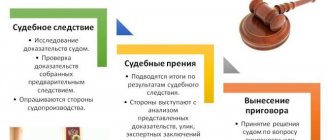Complaint about the inaction of the bailiff
Enforcement proceedings are always the result of a conflict between the debtor and the claimant, which could not be resolved pre-trial. Therefore, it is natural that the work of bailiffs causes many complaints: usually, in the opinion of the claimant, the bailiff works too slowly or does not act at all, and in the opinion of the debtor, on the contrary, too quickly and not always legally.
The following may be subject to appeal: a bailiff's decision to initiate proceedings, forced collection of debts before the expiration of their voluntary repayment, collection of an enforcement fee, refusal to familiarize themselves with materials and other actions that violate the legal rights of citizens. But the most common complaints against bailiffs are related to their illegal, in the opinion of the debtor, actions to arrest and confiscate property (money), or, on the contrary, complaints about the inaction of bailiffs, about the unreasonable delay in enforcement proceedings.
General violations of labor laws.
So, according to Part 1 of Art. 5.27 of the Code of Administrative Offenses of the Russian Federation, employers are held accountable for any violation of labor legislation and other acts containing labor law norms, unless otherwise provided for in Parts 3–5 of Art. 5.27.
The most common violations of labor laws include:
- absence of an order for hiring or termination of an employment contract (part 1 of article 68 and part 1 of article 84.1 of the Labor Code of the Russian Federation);
- violation of the rules for maintaining and storing work books (Article 66 of the Labor Code of the Russian Federation and the Rules for maintaining and storing work books, producing work book forms and providing them to employers, approved by Decree of the Government of the Russian Federation of April 16, 2003 No. 225);
- lack of written consent of employees to expand service areas (Article 60.2 of the Labor Code of the Russian Federation);
- failure to notify each employee in writing about the payment of wages (Part 1 of Article 136 of the Labor Code of the Russian Federation);
- payment of wages once a month or in violation of the deadline (Part 6 of Article 136);
- lack of a working time sheet (Part 4 of Article 91 of the Labor Code of the Russian Federation) and a vacation schedule (Part 2 of Article 123 of the Labor Code of the Russian Federation);
- failure to familiarize employees with the order to grant leave (Part 3 of Article 123 of the Labor Code of the Russian Federation);
- lack of written consent to be hired to work on weekends (Articles 113, 153 of the Labor Code of the Russian Federation);
- violation of the duration of work when working part-time (Part 1 of Article 284 of the Labor Code of the Russian Federation).
We present sanctions for such violations in the table.
| Violation | Sanctions | |
| Executive | Entity | |
| Any violation not provided for in Parts 3, 4 and 6 of Art. 5.27 and art. 5.27.1 Code of Administrative Offenses of the Russian Federation (Part 1) | Warning or fine from 1,000 to 5,000 rubles. | Fine from 30,000 to 50,000 rubles. |
| Repeated violation similar to the violation provided for in Part 1 (Part 2) | Fine from 10,000 to 20,000 rubles. or disqualification for a period of 1 to 3 years | Fine from 50,000 to 70,000 rubles. |
How to write and file a complaint about the inaction of bailiffs
According to the law, a citizen has the right to complain about the actions/inaction of the bailiff to various authorities, including going to court, but we recommend starting with an attempt to resolve the issue out of court, first by pointing out to the bailiff himself the illegality of his actions (inaction). If this does not help, you can file a complaint:
1. To the senior bailiff - the immediate superior of the bailiff who violated the applicant’s rights;
2. To the chief bailiff at the territorial department of the FSSP;
3. To the prosecutor's office;
4. To a court of general jurisdiction (for individuals), or an arbitration court (for organizations), at the place where the bailiff performs his duties;
5. Call the FSSP hotline.
A complaint to the senior (chief) bailiff can be submitted to the office of the bailiff service department (territorial administration of the FSSP):
⦁ personally or through a representative, by proxy;
⦁ by mail (by registered mail with a list of attachments, which lists all the documents attached to the application);
⦁ online - on the FSSP website you need to select the “Appeals” item, then “Online reception”, after which a form for filing a complaint will open, which must be filled out.
The deadline for filing such a complaint is 10 days. 10 days begin to count from the moment when the disputed action (or inaction) of the bailiff was committed, or from the moment when the applicant learned of the violation of his legal rights. This period may be extended if there is a good reason (illness, business trip, late receipt of notification).
The period for consideration of your complaint is 10 days. As a result, you will receive a written response.
A complaint to the prosecutor's office or an application to the court to recognize the action (inaction) of the bailiff as illegal can be filed after the established 10-day appeal period has expired. But at the same time, a petition to restore the time limit for the administrative claim must be attached to the administrative claim to the court.
It is worth noting that filing a complaint with the prosecutor's office is the most effective method. Such complaints are satisfied in 90% of cases. Another advantage is that the prosecutor can demand that certain instructions be followed, set a deadline for performing specific actions, and, if necessary, punish the bailiff. Thus, when filing a complaint with the prosecutor’s office, you will receive real actions (shifts) in enforcement proceedings within 30 days.
When filing a complaint with the court, you will receive a court decision declaring the action (inaction) of the bailiff illegal and imposing on him the obligation to eliminate the violations. The court cannot give specific instructions to the bailiff. But, the advantage of this type of treatment is your right to compensation for moral damage caused by the illegal action (inaction) of the bailiff.
Administrative cases challenging the actions (inaction) of a bailiff are considered by the court within 10 days from the date the court receives the administrative statement of claim. However, if the case is complex, the chairman of the court has the right to extend this period to one month.
The text of the complaint must be drawn up in a certain form in an official business style. The document should not contain grammatical errors, obscene language, insults or excessive emotional overtones. All necessary and supporting documents must be attached to the complaint.
Samples of complaints about the inaction of bailiffs
You can download the general complaint sample form from the link: sample complaint form.rtf
Sample complaint to the senior bailiff
Sample complaint to the prosecutor
Sample complaint to court (statement of claim)
Composition of offenses under Art. 5.27 Code of Administrative Offenses of the Russian Federation.
This article establishes several special and one general offense in the field of labor legislation. Special ones include:
- actual admission to work of a person not authorized by the employer (part 3);
- evasion of registration or improper execution of an employment contract or conclusion of a civil contract that actually regulates labor relations between the employee and the employer (Part 4);
- non-payment or incomplete payment on time of wages or other amounts within the framework of the employment relationship (Part 5).
For all other violations of labor legislation, they are held accountable under Part 1.
For your information:
Responsibility for employers is also established by other articles of the Code of Administrative Offenses of the Russian Federation. For example, for violations of state regulatory requirements for labor protection, employers will be prosecuted under Art. 5.27.1, for violation or failure to fulfill obligations under a collective agreement, agreement - under Art. 5.31, for the dismissal of workers in connection with a collective labor dispute and a strike – under Art. 5.34.
As measures of liability, Art. 5.27 of the Code of Administrative Offenses of the Russian Federation establishes:
- Warning.
- A fine imposed on an official.
- Fine for individual entrepreneurs.
- Fine for a legal entity.
- Disqualification of an official – deprivation of the right of an individual to hold certain positions. It is established for a period of 6 months to 3 years (Article 3.11 of the Code of Administrative Offenses of the Russian Federation).
Let us note that this article establishes liability for a repeated offense: repetition is an aggravating circumstance, and the sanctions for such a violation are more significant.
A repeated offense is a violation similar to a previously committed one, which was committed within a year from the date of entry into force of the resolution imposing an administrative penalty for the first violation (Articles 4.3, 4.6 of the Code of Administrative Offenses of the Russian Federation).
GIT inspectors are held administratively liable for violations of labor laws based on the results of scheduled or unscheduled inspections.
Responsibility for non-payment or incomplete payment of wages/
By virtue of Part 6 of Art. 5.27 of the Code of Administrative Offenses of the Russian Federation, an employer may be held liable:
- for non-payment or incomplete payment on time of wages and other amounts within the framework of labor relations, if there are no signs of a criminal offense (Article 145.1 of the Criminal Code of the Russian Federation);
- due to the establishment of a salary in an amount less than that provided for by labor legislation, that is, less than the minimum wage.
Note:
In addition to administrative (and criminal) liability, the employer is subject to financial liability, which consists of the employer’s obligation to pay compensation to the employee for each day of delay in payment of earnings and other amounts within the framework of labor relations (Article 236 of the Labor Code of the Russian Federation).
Let us remind you that wages must be paid at least every half month. The specific date of payment is established by internal labor regulations, a collective or labor agreement, but no later than 15 calendar days from the end of the period for which it was accrued. If the payment day coincides with a weekend or non-working holiday, then the salary must be paid the day before.
If the salary delay exceeds 15 days, then the employee has the right to suspend work by notifying the employer in writing (Article 142 of the Labor Code of the Russian Federation). Until full payment of earnings, the employee has the right not to be at the workplace. For the specified period, his average earnings are retained. In this case, the employee is obliged to return to work no later than the next working day after receiving written notification from the employer of readiness to pay the delayed salary on the day the employee returns to work.
If facts of violations are revealed, the employer may be held liable under Part 6 of Art. 5.27 Code of Administrative Offenses of the Russian Federation. The punishment will be:
- for officials - a warning or a fine in the amount of 10,000 to 20,000 rubles;
- for legal entities – a fine from 30,000 to 50,000 rubles.
For a repeated violation, liability arises under Part 7 of Art. 5.27, which provides:
- for officials - a fine in the amount of 20,000 to 30,000 rubles. or disqualification for a period of 1 to 3 years;
- for a legal entity a fine in the amount of 50,000 to 100,000 rubles.
* * *
In conclusion, we would like to draw the attention of employers to the fact that even if a violation of labor laws is detected in an organization, the employer may be released from administrative liability. This is permitted if the violation is considered minor. So, by virtue of Art. 2.9 of the Code of Administrative Offenses of the Russian Federation, if the administrative offense is of minor significance, the judge, body, official authorized to resolve the case of an administrative offense may release the person who committed it from administrative liability and limit himself to an oral remark.
Paragraph 21 of the Resolution of the Plenum of the Armed Forces of the Russian Federation No. 5 states that a minor administrative offense is an action or inaction, although formally containing signs of an administrative offense, but taking into account the nature of the offense committed and the role of the offender, the amount of harm and the severity of the consequences that have occurred, which do not represent a significant violation of the protected public legal relations.
Therefore, if the employer committed a single and insignificant violation that did not entail a serious violation of the rules and rights of the employee established by the state, the employer can try to apply for exemption from administrative liability due to insignificance. This must be done in writing.
Personnel department of a state (municipal) institution, No. 7, 2020
Who is the defendant in disputes with the FSSP
Plaintiffs often show unique creativity, presenting demands to the Treasury, to a specific bailiff, and to other bodies and officials.
It must be remembered that Resolution No. 50 of the Supreme Court of the Russian Federation of November 17, 2015 determined that a claim for the recovery of losses incurred through the fault of bailiffs is brought against the Russian Federation, and the FSSP of Russia participates in court hearings on its behalf.
At the same time, if you incorrectly identified the defendant, then the court should not refuse to satisfy the demands, leave the application without progress, but must itself indicate the correct defendant and involve the FSSP in participation in the trial.
Compensation for damage caused by illegal actions of the bailiff
Plaintiffs in such claims can be not only collectors, but also debtors, if the bailiff illegally collected a non-existent debt from them or otherwise violated their interests.
In case A83-6215/2018, it was proven that the company suffered losses because the bailiff illegally sent a collection order to the bank after voluntary payment of the debt (Decision of the Supreme Court of the Russian Federation dated February 24, 2021).
In another case, the claim for damages was satisfied, since the bailiff unlawfully wrote off the same amount twice (Resolution of the Moscow District Arbitration Court dated November 20, 2020 in case No. A40-272851/2019).
But it will not be possible to recover as damages the difference in exchange rates if the bailiff mistakenly wrote off a sum of money and then returned it, since the courts believe that it is an objective factor that does not have a causal relationship with the result of the assessment of the illegal behavior of an official ( Appeal ruling of the St. Petersburg City Court dated July 3 in case No. 2-115/2018).
By the way, you can read in the article how to compensate for the damage caused by the crime.
What needs to be proven?
To induce the court to make a decision in favor of the plaintiff, it is necessary to confirm with evidence: the illegality of the bailiff’s behavior, the fact itself and the amount of damage, as well as the connection between them.
In addition, it is necessary to collect evidence that the debtor had money, real estate or other things that could be foreclosed on, but due to the fault of the bailiff, the debtor got rid of it, and there is no other liquid property.
Courts very often refuse to recover damages from bailiffs, so in such cases it is necessary to involve lawyers specializing in this area. Since proving all the necessary elements for compensation for harm requires professionalism, experience, and the ability to convince the court that you are right. An experienced lawyer, knowing the rights and obligations of the bailiff, will be able to prove that the bailiff did not take all possible actions or that his behavior was illegal. The lawyer has the right to send legal requests, to which bodies and officials are required to respond, thereby he can receive confirmation that the debtor had money at the time of the start of enforcement proceedings, but since the bailiff did not find out this, the money was wasted and nothing else the debtor does not.
If the bailiff did everything possible, but the decision was not executed due to the fault of the debtor, then the FSSP should not be held responsible for this (for example, decisions of the Arbitration Court of the Moscow District dated 03/12/2021 in case No. A40-30052/2020, dated 07/09/2020 in case No. A40 -3755/2019, Ruling of the Supreme Court of the Russian Federation dated 02/06/2019 in case No. A60-33019/2017, Appeal ruling of the Moscow City Court dated 07/04/2017 in case No. 33-25734).
Harm and damage, what's the difference?
Article 16 of the Civil Code of the Russian Federation refers to the recovery of losses from officials and government bodies, and Article 1064 of the Civil Code of the Russian Federation refers to compensation for damage.
For the purposes of applying Article 1064 of the Civil Code of the Russian Federation, the Supreme Court interprets harm as a decrease in a material or intangible benefit protected by law. In turn, causing such property damage entails the obligation of the guilty party to compensate for losses (Determination of the RF Armed Forces No. 81-KG14-19 of January 27, 2015).
By virtue of clause 2 of Art. 15, art. 16 of the Civil Code of the Russian Federation, losses are the expenses that the victim is forced to bear in order to restore his violated rights, his damaged goods, as well as the death or damage to his property (real damage). In addition, losses include lost profits.
Thus, harm is a broader concept; it implies damage, a decrease in some benefits; harm can be both moral and material. And damage is a material consequence of caused property damage, expressed in the incurrence of expenses for the restoration of rights or the loss of certain property.
Moral injury
Moral damage is subject to compensation when personal non-property rights or intangible benefits are violated (Article 151 of the Civil Code). By virtue of Part 2 of Article 1099 of the Civil Code of the Russian Federation, if only property interests were damaged, then moral damage is compensated only if this is directly established by law. The Supreme Court of the Russian Federation in its Determination of March 21, 2016 No. 309-ES16-813) indicated that the executive legislation does not contain any indication of the possibility of compensation for moral damage, therefore causing material damage does not entail compensation for moral damage.
This is only possible if it can be proven that as a result of the unlawful behavior of officials, intangible benefits (life, health, business reputation, inviolability of home, freedom of movement, family secrets, etc.) were damaged.
For example, moral damages were compensated to a citizen who was unable to go on vacation abroad with his wife because the bailiff did not promptly inform the border service about the lifting of restrictions. The unlawful behavior of the bailiff encroached on the intangible benefit belonging to the plaintiff (Article 150 of the Civil Code of the Russian Federation) - freedom of movement, and the right to family vacation was also violated, in addition, the plaintiff was a consumer of tourism services (Appeal ruling of the Kostroma Regional Court dated January 14, 2021 N 33-55/2019).
There is an interesting letter from the FSSP of Russia dated December 23, 2011 No. 12/01-31392-AP , which provides an example of decisions of the Zavolzhsky District Court of Tver in case No. 2-2069/2011 and case No. 2-2070/2011. The debtor received compensation for moral damage due to the fact that during the forced eviction of himself and his minor children, the bailiff filmed a video, and subsequently the video was shown on television without the debtor’s consent.
But in another case, the plaintiff did not receive compensation for moral damage, since he did not prove that it was the bailiff’s long-term failure to comply with the court decision that led to his illness (Appeal ruling of the Kostroma Regional Court dated April 15, 2021 No. 33-641/2019).





